LEWISTON — This spring, System Logistics is investing $6 million in new equipment to build high-tech storage systems here that have been made at a sister plant in Italy.
To do that, much of the factory floor off Alfred Plourde Parkway has been emptied to make room for the 21st century.
“We had one (machine) from 1922 that was museum-type of stuff,” said Rob Dolci, a spokesman for Modula, one of System Logistics’ two divisions, walking through the plant on a tour.
The entire upgrade won’t go live until this summer, but new machines already installed make quite an impression. Sleek and gray, they pop, hiss and zip in quick, efficient strokes, so heavy on electronics it looks like they jumped out of an episode of the Discovery Channel’s “How It’s Made.”
Instead of automating people out of a job, the company hopes to grow the workforce.
It nearly didn’t happen.
Two years ago, Italian owner Franco Stefani considered closing up shop just four years after buying the former Diamond Phoenix property.
“This is where it’s clear we are a company owned by a person, not a public company, because all the economic factors will advise to go to the Midwest,” said Miguel Fabra, Modula chief operating officer.
“Mr. Stefani got right to the point: ‘I close the company or I change the focus,'” Fabra said. “He decided to change the focus. ‘Let’s keep it open; let’s keep it in Maine.'”
Old meets new
Diamond Phoenix originally began as Lewiston Machine Co. in 1946, later merging with Diamond Machine and served the shoe industry, according to Sun Journal archives.
By 2005, it moved to its current 100,000-square foot factory and transitioned from building shoemaking equipment to making the parts to store them when it built the largest carousel system in the world to hold 1.5 million pairs of shoes for Zappos.com.
It’s specialty had become carousels and warehouse conveyor belts.
Systems SPA, System Logistics’ parent company, operates in 33 countries with 1,400 employees and was founded by Stefani in 1970. Fabra said Stefani got his start after working at a ceramic tile company, seeing how the machines could be improved and setting out to do it better.
“He’s mostly an inventor,” Fabra said.
Part of the company is still involved in ceramics. Another division runs a factory in Grand Rapids, Mich., that specializes in outfitting multimillion-dollar distribution centers for the beverage industry.
“In 2009, it was decided to invest more in USA and we decided to buy what is then Diamond Phoenix,” Fabra said.
But from the start, the bottom line wasn’t great and its efforts were spread too thin.
“From 2000 until last year, the company had positive numbers only two years,” he said. “We were trying to be a company that followed everything into logistics. It tried to do everything for everybody.”
That led to Stefani’s ultimate decision to change course and invest rather than move and lay off.
“He takes pride in taking care of his people,” Fabra said. “It was completely not an economical decision to stay here. Then it was our task to make it a good economical decision.”
The new focus: high-tech vertical lift storage systems, along with re-engineering the warehouse carousels it’s known for.
Going up
More than 1,000 lifts are already in use in U.S. factories, Fabra said. Those units, which range from $40,000 to $100,000, came from Italy and took 10 to 12 weeks to arrive. By making them in the U.S., the wait is down to two or three weeks. Time isn’t lost in transit and there’s less hassle with exchanging currency.
Lifts are anywhere from 4 to 13 feet wide and built as high as the customer wants, up to 4 inches shy of the ceiling, Dolci said. Inside a clean, white shell are stacks of stainless steel trays holding up to 2,200 pounds that operators call up by a computer. Trays are fetched and glide into place within 30 seconds.
Some customers use them to store components — tools, jigs, auto parts — while some, like the military, use them to store finished guns, weapons and helmets; the same computer used to call up drawers can also limit access to only authorized users, making them attractive to store anything expensive or anything that can be tampered with, Dolci said.
Units can be broken down, moved and added on as needs change.
“Most factories, distribution centers do not exploit vertical access,” Dolci said. “Most of the time you’ve got plenty of space available up high. Also, the moment you reduce the floor space, you have much less walking and climbing up and down racks because the machine will bring the products to you. The picker will gain 2.5 times the productivity because it just slashes his walking time. And as you do that, there’s less risk of injuries, better accuracy in picking because you’ve got better lighting.”
The long-term goal is to make 700 to 750 units a year. It’s also to grow, first retraining the 43 employees here and adding more.
System Logistics is having its first business open house Wednesday, inviting 120 people from New England and Canada, as well as some of its Lewiston neighbors, to show what it can do and how the company is evolving.
It also wants to highlight the investment in manufacturing and why it makes sense, for the impact on the local economy and as a lure for future workers.
“If you think of manufacturing, the old, dirty, risky job it was 30 to 40 years ago, that’s not an attraction,” Dolci said.
Going overseas isn’t the cost advantage it once was, according to Dolci. Companies in Asia are starting to pay their workers more; gains through automation make it possible to compete here.
“This will be the year where we will make all these adjustments to, I hope, get to the break-even (point) at the end of the year,” and then see growth, Fabra said.
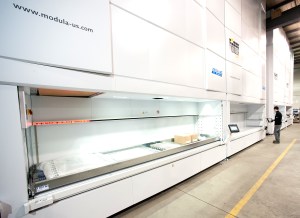
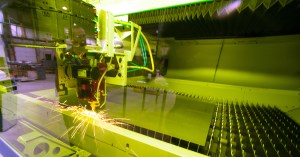
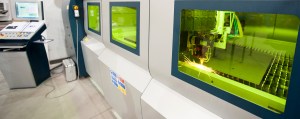
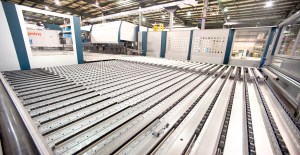
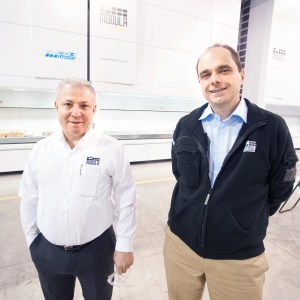
Comments are no longer available on this story